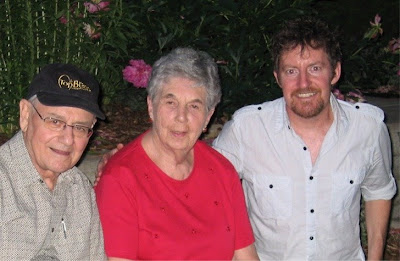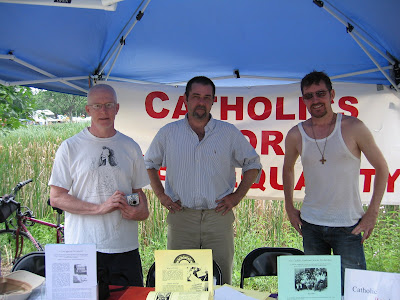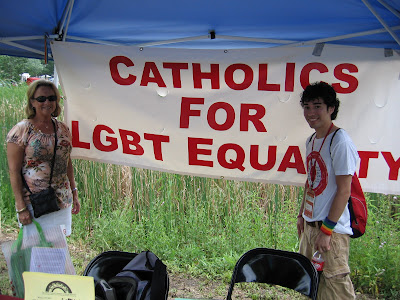.David R. Weiss shares words of compassion and beauty
in response to an unknown gay friend living in fear
 Friends, I have to say that the following essay by theologian, writer, and poet David R. Weiss (pictured at right) is probably the most beautiful thing I’ve had the honor of reprinting at The Wild Reed. I share it today with David’s permission and as the sixth part of my special “Gay Pride 2009” series — and I dedicate it to all of my LGBT brothers and sisters who continue to live in fear, isolated from the awareness of our loving God’s all-inclusive welcome and acceptance.I should note that this particular piece by David was first published in 1999 in the Luther College Campus Ministry newsletter. It was subsequently published in the October 2002 issue of the Lutherans Concerned/Twin Cities newsletter.The heart of David’s essay is his prose/poem, “Words Offered at the End of the Day to An Unknown Friend Living in Fear.” As you’ll see, this powerful prose/poem was first published in the University of Notre Dame’s Scholastic Magazine, February 21, 1997.Finally, this essay and more of David’s eloquent writings can be found in his book, To the Tune of a Welcoming God: Lyrical Reflections on Sexuality, Spirituality, and the Wideness of God’s Welcome.
Friends, I have to say that the following essay by theologian, writer, and poet David R. Weiss (pictured at right) is probably the most beautiful thing I’ve had the honor of reprinting at The Wild Reed. I share it today with David’s permission and as the sixth part of my special “Gay Pride 2009” series — and I dedicate it to all of my LGBT brothers and sisters who continue to live in fear, isolated from the awareness of our loving God’s all-inclusive welcome and acceptance.I should note that this particular piece by David was first published in 1999 in the Luther College Campus Ministry newsletter. It was subsequently published in the October 2002 issue of the Lutherans Concerned/Twin Cities newsletter.The heart of David’s essay is his prose/poem, “Words Offered at the End of the Day to An Unknown Friend Living in Fear.” As you’ll see, this powerful prose/poem was first published in the University of Notre Dame’s Scholastic Magazine, February 21, 1997.Finally, this essay and more of David’s eloquent writings can be found in his book, To the Tune of a Welcoming God: Lyrical Reflections on Sexuality, Spirituality, and the Wideness of God’s Welcome.____________________________________________
Spirituality and Coming Out
By David R. Weiss
A couple of years ago, while teaching at Luther College, I was asked to share some thoughts on “Spirituality and Coming Out” as part of Luther’s Coming Out Day recognition. This presented a bit of a challenge for me as I am an Ally, not an out GLBT person. However, I knew that even on Luther’s relatively friendly campus, the price paid for being both out and Christian could be quite high. So this is a short reflection I offered on my “coming out” as an ally for GLBT persons.I “came out” in February 1997. By then I had already come to a fairly well-developed sense of why I affirmed the integrity of sexual orientations other than just heterosexual. Driven by more than simply tolerance, I was increasingly persuaded that God’s freedom to love, affirm, and include such persons was far bigger than any of the prejudices I grew up with. I had a number of gay and lesbian friends, and I was openly, even articulately supportive of them – behind closed doors. Not that I was in any way anti-gay in public. I was just decidedly silent.While a graduate student at Notre Dame I read through the regular waves of debate over homosexuality in the daily student newspaper (debates carried out almost entirely by straight persons). I was disturbed by the rhetoric, but remained otherwise quiet. Notre Dame’s Catholic tradition wasn’t my own. This was not my issue. Not my cause. Bottom line: not my life. So why take the risk?In the spring of 1996 I began teaching at Notre Dame, and very subtly my perspective began to change. The mass of Notre Dame undergraduates, previously just a sea of faces to me, suddenly and inescapably had names . . . feelings . . . and lives. Then, the following February I read a poem in Scholastic, a weekly student magazine. Entitled “Living in Fear,” it was written by an anonymous gay senior student at Notre Dame and recounted his daily four-year battle toward self-acceptance while driven by fear to remain in the closet. This time, perhaps because this wasn’t a debate but a poignant lament, I wasn’t “disturbed but quiet,” I found myself weeping and raging. Late into the night I poured myself out onto paper in a long letter of response that I titled “Words Offered at the End of the Day to An Unknown Friend Living in Fear.” In it I ransacked the Bible for every manner of image to comfort and affirm him (and there are many of these!). As I put it in the letter, “I see now that if God keeps silent in the face of your anguish, it is only because I wouldn’t lend God the use of my words.” Later on I wrote, “Against all this [the fear] that you know so well I can offer only words — but maybe this is precisely what I have not done often enough or loud enough or long enough.”When my letter ran in the next week’s Scholastic, I was “out.” An ally. And there was no going back. I received a good number of e-mails of gratitude — but also more than a few words of derision. Coming out — even just as an Ally — has its price. But also its rewards, which leads me to my point about coming out and spirituality. I had reached a place where for me not to come out publicly as an ally of GLBT persons would have been, by my silence, to deny the very graciousness of the God who has encountered me. Instead, coming out as an ally has afforded me the chance to get on with the essential work of integrating my personal spirituality with my public commitments—the vocation of living my whole life in response to God’s grace. I know from friends that this is true for GLBT persons as well. It’s hard to hear the gospel in private if fear keeps you in the closet in public.So I might be tempted to close with an invitation to all GLBT persons to “come out,” but I don’t think that’s my invitation to make, at least not directly. I can say, if you’re an Ally still in the closet, National Coming Out Day is for you, too. However, my direct task is to keep on “coming out” myself as an Ally, again and again, to do what I can to make the room beyond the closet a place that is safe when the closet door is opened by someone from the inside. And that’s not something I do as an “extra” or “add-on” to my spirituality; it’s the way I bear witness to the God I know.This prose-poem appeared in the Notre Dame’s Scholastic Magazine, February 21, 1997.Words Offered at the End of the Day
to An Unknown Friend Living in Fear
By David R. Weiss
I need to say this quietly in deference to your eloquent anguish. But I need to say it nonetheless. And I am angry, and it will be hard to keep my voice down; angry not at you but for you. And if I misread the last lines of your poem and you already know all this, that’s okay. I’m sure someone else needs to hear it.You say, “God knows, but God loves me anyway.” Wait. Let me say it gently but firmly—unequivocally. God does not love you “anyway” — despite your being gay. God does not need to overlook the way you are to smile at the beauty of your humanity, at the earthy reflection of divine love as you are gaily—and I don’t mean just “happily” — imago Dei.Do you hear me, my friend? I will be downright strident about this because I see now that if God keeps silent in the face of your anguish, it is only because I wouldn’t lend God the use of my words. Well, here they are.When Hosea spoke of a day when God would have pity on “Not-pitied” and would say to “Not-my-people,” you are my people—Hosea meant you, and I hope that day is now. When Isaiah welcomed foreigners and eunuchs (ever before outcast from the presence of God) into the Temple—well, Isaiah meant to welcome you as well, and to name your praise, like their praise, as more dear to God than even that of the faithful Jews (or Christians), perhaps because your praise is brought over the objections and insults of so many of us — and yet still finds its way to God. And when Peter was treated to that heavenly picnic of assorted forbidden foods it was to remind him of Isaiah’s self-same insight, that the church dare not exclude those who come at God's own call.When Jesus stopped to speak and sip with the Samaritan woman at the well, perhaps she, too, thought that his fellowship came to her “anyway,” despite her ethnic outcast baggage. But I tell you, my friend, and I am not scared to be flamboyant if need be: Jesus offered her living words and living water because of who she was. He relished her Samaritan beauty; he chose her for the Kingdom, and when he did, he meant for you to feel chosen, too, not despite, but because of your gayness. So, when you picture her and him standing at the well, remember that while many in the church might prefer you didn’t exist, or at least didn’t tell us who you are, Jesus is stopping to chat because you caught his eye not “anyway”—but just the way you are.Can you hear me, yet, my friend? I am not afraid to be audacious if I have to. When Jesus sent his disciples out two by two, he said to them if any town refused to welcome them in his name, well, on judgment day those towns would fare far worse than Sodom and Gomorrah. Okay, it isn’t in the text — I admit it — but I will say it anyway because it’s true: Jesus meant to say as much to all you same-sex couples who, not unlike those disciples, come, two by two, hoping for a bit of hospitality from the church. What irony that we who have so long burdened you with the guilt of Sodom and Gomorrah find that the fire and brimstone are finally aimed our way.And when Jesus said that foxes have holes and birds have nests but the Son of Man has no place to lay his head he knew that if ever a day came when churches with their omnipresent crosses of gilded gold thought that now Christ surely had a place to lay his head, he knew that you, my friend, would know better. For with your anguish every night you bear a fearful witness to us all. Until your head rests fully welcome within these walls—until then Christ keeps his weary watch outside with you, still after all these years aching and envious of foxes and birds.I hope that you have heard, my friend. I tremble for the silent “no” that closes out — and closets in — each day, the quiet daily unmaking of yourself by fears all too well founded. Against all this that you know so well I can offer only words — but maybe this is precisely what I have not done often enough or loud enough or long enough. So, I hope, my unknown friend, that at the end of this day, and the next, and on and on, that when you crawl beneath your covers of so much more than linen you remember these words I offer in gentle but firm—unequivocal, strident, flamboyant, audacious witness: You are loved by God already now, not "anyway," but fully because of who and how you are.And I wait with you for the day when “no” becomes “yes,” and you place yourself truthful in our midst. I wait patiently, because who am I to tell you when to step beyond the fears that we have heaped up in your way? And because who am I to think your fear is not, in part indebted to the comfort of my own silence? And I wait impatiently, because I know at least this much that God is anxious for you to share the joy God takes in the very beauty of who and how you are.David Weiss is a theologian, writer, poet and hymnist doing “public theology” around issues of sexuality, justice, diversity, and peace. His first book is entitled To the Tune of a Welcoming God: Lyrical Reflections on Sexuality, Spirituality, and the Wideness of God’s Welcome. Above: David Weiss (back row, third from left) with members
Above: David Weiss (back row, third from left) with members
of Dignity Twin Cities - Friday, June 26, 2009.
David’s wife Margaret stands at left in the front row.
Coming Out: An Act of Holiness
Making Love, Giving Life
The Real Sodomites: Proponents of Proposition 8For previous posts in this series, see:
A Mother’s Request to President Obama: Full Equality for My Gay Son
Marriage Equality in Massachusetts: Five Years On
It Shouldn’t Matter. Except it Does: John Corvino Reflects on the Coming Out of Adam Lambert
Gay Pride as a Christian Event
Not Just Another Political Special Interest GroupSee also the related Wild Reed posts:
Gay People and the Spiritual Life
The Gifts of Homosexuality
The Many Manifestations of God’s Loving Embrace
Be Not Afraid, You Can Be Happy and Gay
The Many Forms of Courage (Part I)
The Many Forms of Courage (Part II)
The Many Forms of Courage (Part III)



 Right: With my friend Mary Vaughn at the 24th Annual Bloomsday celebration in St. Paul. Mary’s book, Pistol Pete’s Memoirs of Camp Pekin: A Federal Prison, has recently been published.
Right: With my friend Mary Vaughn at the 24th Annual Bloomsday celebration in St. Paul. Mary’s book, Pistol Pete’s Memoirs of Camp Pekin: A Federal Prison, has recently been published.



























































